外研(新标准)版八年级下册Module 4 Seeing the doctor复习课件(共73张PPT)
文档属性
| 名称 | 外研(新标准)版八年级下册Module 4 Seeing the doctor复习课件(共73张PPT) |  | |
| 格式 | pptx | ||
| 文件大小 | 670.7KB | ||
| 资源类型 | 教案 | ||
| 版本资源 | 外研版 | ||
| 科目 | 英语 | ||
| 更新时间 | 2024-05-16 20:20:31 | ||
图片预览


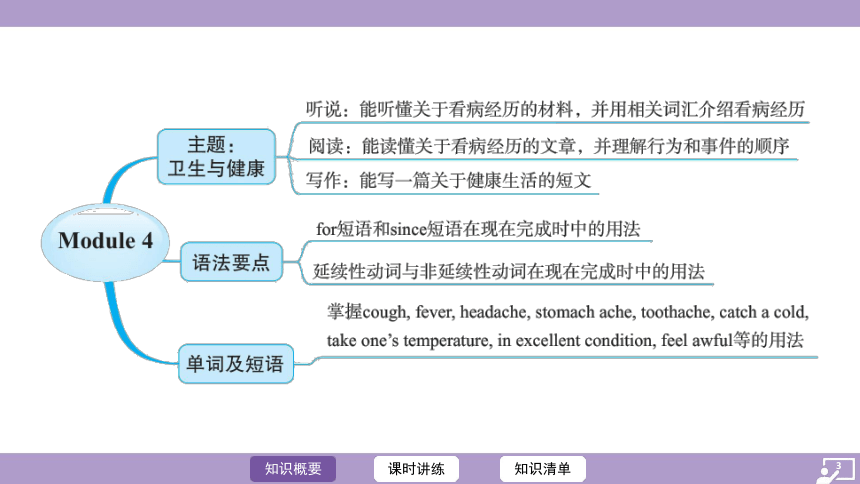
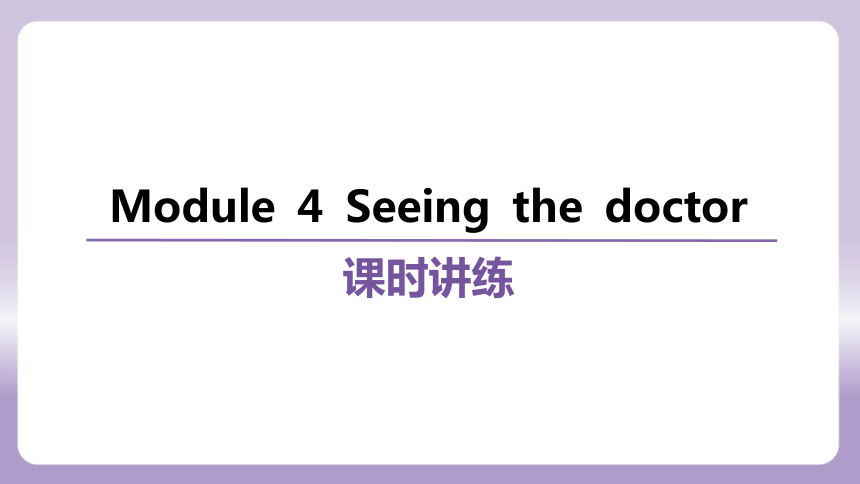
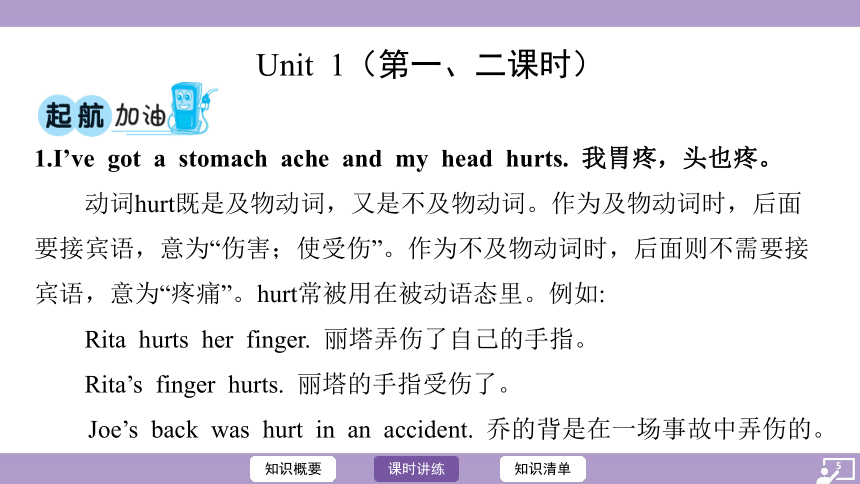
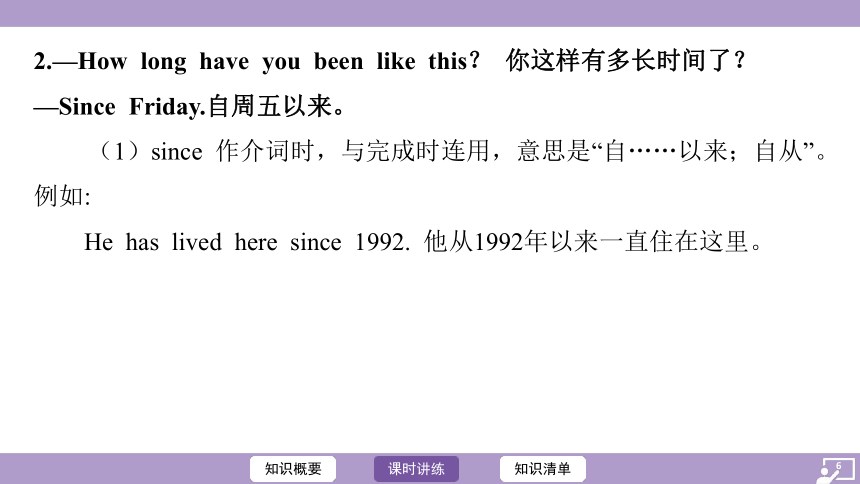
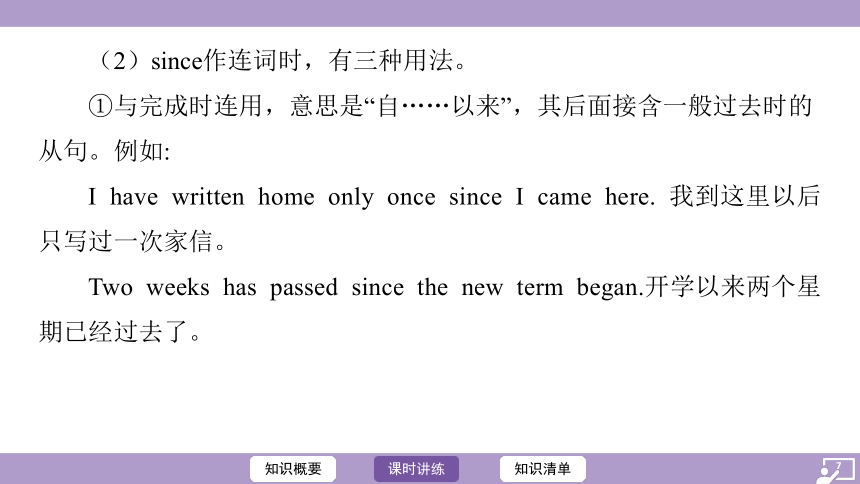
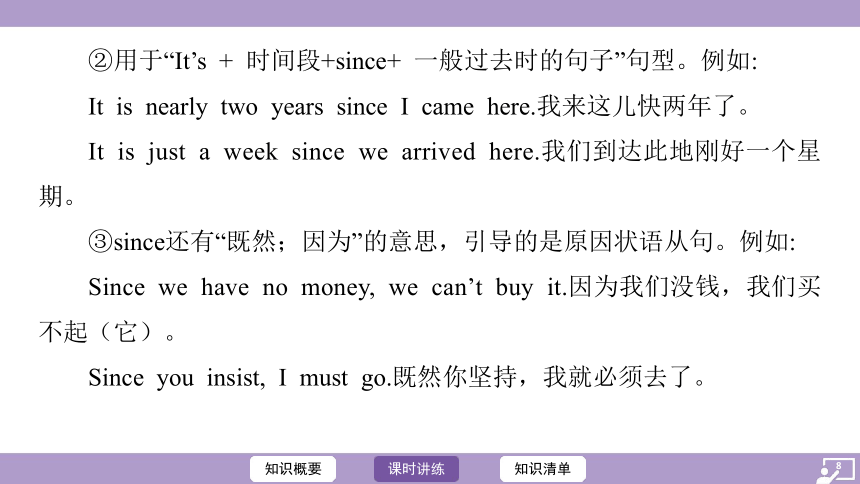
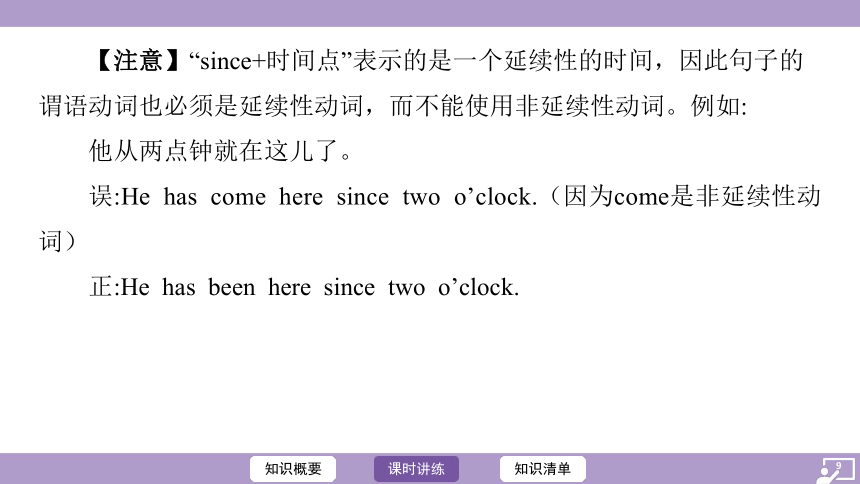
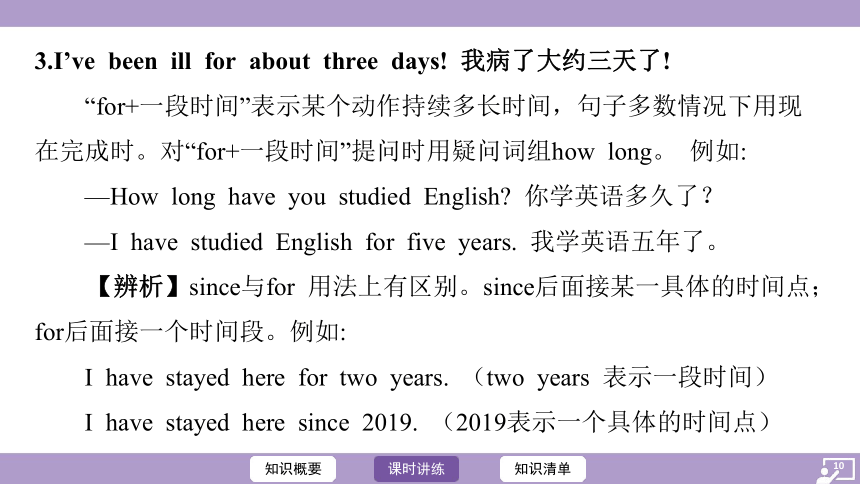
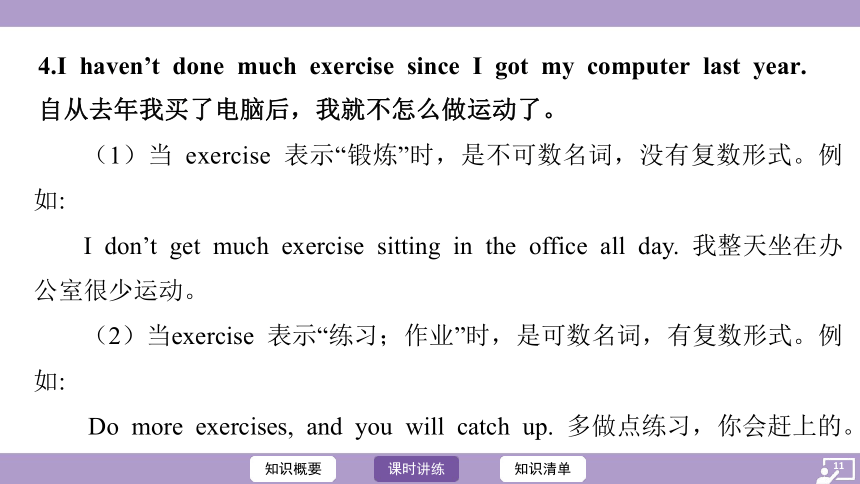
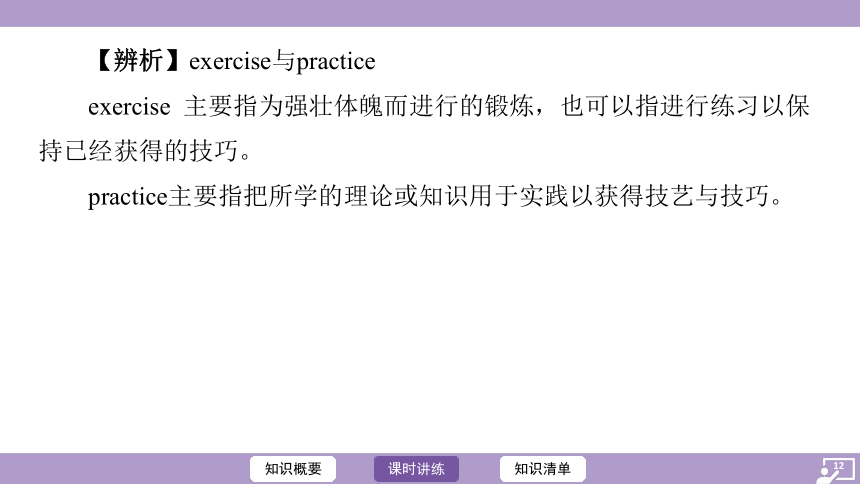
文档简介
(共73张PPT)
Module 4 Seeing the doctor
Module 4 Seeing the doctor
知识概要
Module 4 Seeing the doctor
课时讲练
Unit 1(第一、二课时)
1.I’ve got a stomach ache and my head hurts. 我胃疼,头也疼。
动词hurt既是及物动词,又是不及物动词。作为及物动词时,后面要接宾语,意为“伤害;使受伤”。作为不及物动词时,后面则不需要接宾语,意为“疼痛”。hurt常被用在被动语态里。例如:
Rita hurts her finger. 丽塔弄伤了自己的手指。
Rita’s finger hurts. 丽塔的手指受伤了。
Joe’s back was hurt in an accident. 乔的背是在一场事故中弄伤的。
2.—How long have you been like this? 你这样有多长时间了?
—Since Friday.自周五以来。
(1)since 作介词时,与完成时连用,意思是“自……以来;自从”。例如:
He has lived here since 1992. 他从1992年以来一直住在这里。
(2)since作连词时,有三种用法。
①与完成时连用,意思是“自……以来”,其后面接含一般过去时的从句。例如:
I have written home only once since I came here. 我到这里以后只写过一次家信。
Two weeks has passed since the new term began.开学以来两个星期已经过去了。
②用于“It’s + 时间段+since+ 一般过去时的句子”句型。例如:
It is nearly two years since I came here.我来这儿快两年了。
It is just a week since we arrived here.我们到达此地刚好一个星期。
③since还有“既然;因为”的意思,引导的是原因状语从句。例如:
Since we have no money, we can’t buy it.因为我们没钱,我们买不起(它)。
Since you insist, I must go.既然你坚持,我就必须去了。
【注意】“since+时间点”表示的是一个延续性的时间,因此句子的谓语动词也必须是延续性动词,而不能使用非延续性动词。例如:
他从两点钟就在这儿了。
误:He has come here since two o’clock.(因为come是非延续性动词)
正:He has been here since two o’clock.
3.I’ve been ill for about three days! 我病了大约三天了!
“for+一段时间”表示某个动作持续多长时间,句子多数情况下用现在完成时。对“for+一段时间”提问时用疑问词组how long。 例如:
—How long have you studied English 你学英语多久了?
—I have studied English for five years. 我学英语五年了。
【辨析】since与for 用法上有区别。since后面接某一具体的时间点;for后面接一个时间段。例如:
I have stayed here for two years. (two years 表示一段时间)
I have stayed here since 2019. (2019表示一个具体的时间点)
4.I haven’t done much exercise since I got my computer last year.
自从去年我买了电脑后,我就不怎么做运动了。
(1)当 exercise 表示“锻炼”时,是不可数名词,没有复数形式。例如:
I don’t get much exercise sitting in the office all day. 我整天坐在办公室很少运动。
(2)当exercise 表示“练习;作业”时,是可数名词,有复数形式。例如:
Do more exercises, and you will catch up. 多做点练习,你会赶上的。
【辨析】exercise与practice
exercise 主要指为强壮体魄而进行的锻炼,也可以指进行练习以保持已经获得的技巧。
practice主要指把所学的理论或知识用于实践以获得技艺与技巧。
5.You spend too much time in front of the computer. 你花费太多的时间在电脑上了。
【辨析】too much与much too
短语 意义及用法 例句
too much “too much+不可数 名词”表示 “太多……” There was too much work for one
person.对一个人来说,太多活了。
much too “much too+形容词 或副词”表示 “太……” They walked much too fast. I couldn’t
catch up with them.他们走得太快,我跟
不上。
6. It can be very harmful to your health. 这对你的健康非常有害。
be harmful to意为“对……有害”,相当于do harm to。例如:
Spending too much time playing computer is harmful to you all. 玩太多电脑对你们都有害。
一、根据中文提示写出正确的单词。
1.Mary can’t come to the party today because her mother is ___
(有病的).
2.Sally had an _____(疼痛) in her back because she had an
accident yesterday.
ill
ache
3.She had a high ______(发烧).
4.I feel sleepy and have a cough today. I think I must catch a _____
(感冒).
5.The ___________(温度)of the water was about 40 degrees.
6.We must exercise for half an hour a day to be in good _______
(健康).
fever
cold
temperature
health
二、用括号中所给单词的正确形式填空。
1.She has _____(be) ill for two weeks without taking any medicine.
2.Please stop _______(take) so much cold drink before dinner.
3.They will go out and play football, since they _____________(finish)
their homework.
4.David has poor eyesight now because he spent too much time
_________(watch) TV.
5.It has been 5 years since we _____(meet) in Beijing last time.
been
taking
have finished
watching
met
三、单项选择。
( ) 1.—Jim, what’s wrong with you
—My head hurts and I feel sleepy now. I think I have caught
________ cold.
A
A.a B.the C.\
( ) 2.My cousin is ________ heavy because he often eats
________ fast food.
B
A.much too; too many B.much too; too much C.too much; much too
( ) 3.I have collected stamps ________ I was ten years old.
A.before B.since C.when
B
( ) 4.—________ have you been away from China
—________3 years. I will be back in a month.
C
A.How far; For B.How long; Since C.How long; For
( ) 5.If you want to be in good ________, you should eat
________ food.
C
A.healthy; health B.healthy; healthy C.health; healthy
( ) 6.Reading in the sun is ________ your eyes. Be careful.
A
A.harmful to B.good to C.clean for
( ) 7.—How can I help you
—________
B
A.I’m just kidding. B.I feel ill. C.I’m just looking.
四、情景交际。从方框中选择恰当的句子补全对话。其中有一项是
多余的。
A: Hi, Amy.
B: Hi, Tom. You don’t look well. 1. .
A: I have a stomach ache.
B: 2. .
A: I had nothing but some
fast food.
F
D
A. Maybe it’s a good idea.
B. Do you often eat fast food for lunch
C. It’s bad for your health.
D. What did you eat for lunch
E. How much is it
F. What’s the matter with you
B: That’s the problem. 3. .
A: Yes, very often. You know, I am very busy and have little time for lunch.
B: Oh, but it’s not a good habit. 4. .
A: I got it. I will try to eat more healthy food.
B: If you are busy at noon, you can take your meal from home. Your mother will like to cook
it for you.
A: 5. . I will try.
B
C
A
A. Maybe it’s a good idea.
B. Do you often eat fast food for lunch
C. It’s bad for your health.
D. What did you eat for lunch
E. How much is it
F. What’s the matter with you
五、选词填空。根据短文内容,从方框中选择适当的单词填空。部
分单词需要进行词形变换。
hurts takes catch fast healthy
harmful run feels why since
John often feels ill these days. He has got a stomach ache and his head 1. .. He has been like this 2. . last Sunday. So he goes to see the doctor. The doctor 3. . his temperature, but there’s no fever. It seems that he hasn’t 4. . a cold. He tells the doctor he usually eats 5. . food and that he doesn’t usually have
hurts
since
takes
caught
fast
breakfast in the morning. The doctor knows the problem. That’s 6. . he has got a stomach ache. He has an 7. . diet and he doesn’t do much exercise. It can be 8. . to his health. The doctor asks John to get more exercise, such as 9. . or swimming, and take the medicine. John 10. . better now.
why
unhealthy
harmful
running
feels
hurts takes catch fast healthy
harmful run feels why since
Unit 2(第三、四课时)
1.I was not feeling very well...我感到有点不舒服……
well的用法:
(1)用作形容词,意为“健康的”,常用在描述人的身体状况。例如:
The girl feels well after taking medicine. 吃了药后女孩感觉好了。
(2)用作副词,意为“好”,修饰动词。例如:
Do you eat well at school? 你在学校吃得好吗?
2.Now I get exercise by taking him for a walk every day. 现在我通过每天带他散步来锻炼。
by doing sth.表示“通过某种方式做某事”或“凭借某样东西做某事”。by是介词,意为“通过某种方法或手段”,可以接名词、动名词或代词作宾语。例如:
He goes to work by bike every day.他每天骑自行车上班。
He learns English by taking notes.他通过记笔记学习英语。
3....and she also takes part in the training with us. ……她也与我们一起参加了培训。
【辨析】take part in,join和join in
单词及短语 意义及用法 例句
take part in 意为“参加”,侧重于参加活动,指 参加会议或群众性活动等,着重说 明句子的主语参加该项活动并在活 动中发挥作用 Would you like to
take part in the
party tonight? 你愿
意参加今晚的聚会
吗?
单词及短语 意义及用法 例句
join 意为“参加”,后接人或某个组织、 党派、团体、机构,指加入某个党 派、团体或组织等并成为其中的一 个成员,多指参军、入团、入党, 等等。join sb.的意思是“加入某人” He is too young to
join the army.他太
年轻了,还不能参
军。
Would you like to
join us? 你想加入
我们吗?
续表
单词及短语 意义及用法 例句
join in 意为“参加”,一般指参加小规模的 活动,如球赛、游戏等 Come along, and
join in the ball
game.快,来参加球
赛。
续表
4.Since then, it has become part of my life. 自那以后,它成为我生活的一部分。
since then表示“从那时起”。其后一般要用现在完成时。例如:
I have never been there since then. 从那时起,我就没有再去过那里。
5.Why don’t we go for a run before school? 为什么去上学之前我们不跑一会儿步呢?
“Why don’t... ”通常用来提出建议,这一句可以简化为“Why not go for a run before school ”。注意,简化后,not之后用动词原形。例如:
Why don’t we have a try = Why not have a try?为什么我们不试一试?
同意对方的提议时,可回答: Good idea.
不同意对方的提议时,可回答: I’d love to, but I am afraid...
6.So we started running a week ago.所以一周前我们开始跑步了。
start doing sth.意为“开始做某事”,也可以说start to do sth.,两者没有区别。在英语中,start与begin之后用to do或doing作宾语,在含义上没有多大的区别。
一、根据中文提示写出正确的单词。
1.Some people would like to keep _____(宠物).
2.The little boy was _______(打瞌睡的) while listening to the soft
light music.
3.She turned on the TV and heard the ______(糟糕的) news.
4.________(也许,可能)it would be better if you can come back
tomorrow.
pets
sleepy
awful
Perhaps
5.They have been working very hard since _____(那时).
6.The old grandma is too ______(虚弱的) to speak a word now.
7.A good training programme is one of the __________(状况) for
our success.
8.The mind needs ________(运动) as well as the body.
then
weak
conditions
exercise
二、用括号中所给单词的正确形式填空。
1.The little boy looks weak because he has got a terrible _______(ill)
these days.
2.I am so proud to be one of the first _________(member) in our
school band.
3.My grandpa reads a ______(day) newspaper while having breakfast
every morning.
illness
members
daily
4.Most of us need to live a more peaceful life to be ________(health)
and happy.
5.You may feel _______(sleep) during class tomorrow if you stay
up too late at night.
healthy
sleepy
三、单项选择。
( ) 1.—What’s wrong with you, Jim
—I have got a headache. I feel ________ now.
C
A.well B.good C.awful
( ) 2.With the help of the doctors and nurses, the old man is
________ excellent condition now.
B
A.on B.in C.of
( ) 3.I have no idea about the result of the match because I was
________ at that moment.
A
A.sleepy B.active C.simple
( ) 4.Sally was ________ in maths, so she spent most of her time
on it.
B
A.dry B.weak C.strong
( ) 5.My sister has a ________ and my mum takes her to the
dentist(牙科医生).
B
A.headache B.toothache C.stomach ache
( ) 6.If you feel uncomfortable, you’d better ________ your
temperature in time.
B
A.show B.take C.treat
( ) 7.—Would you like to ________ the party
—I’d love to. I always like parties.
A
A.take part in B.join C.join to
( ) 8.Her family ________ the city for nearly ten years, so they
know the city well.
C
A.have gone to B.have been to C.have been in
( ) 9.—Is Jim in your office now
—No, he ________ to the dining hall.
C
A.goes B.would go C.has gone
( ) 10.—Why don’t we buy her some flowers
—________
A
A.Good idea. B.No, thanks. C.You are clever.
四、情景交际。从方框中选择恰当的句子补全对话。其中有一项是
多余的。
A: Good morning, doctor.
B: Morning. What’s your problem, madam
A. Is it serious, doctor
B. No, I took her temperature half an hour ago and it was all right.
C. She coughs badly and can’t sleep at night.
D. Thank you.
E. With my pleasure.
F. For two days.
A: This is my daughter. She’s not feeling well.1. .
B: How long has she been like this
A: 2. .
C
F
B: Does she have a fever
A: 3. .
B: Let me check her over. I think she has caught a cold.
B
A. Is it serious, doctor
B. No, I took her temperature half an hour ago and it was all right.
C. She coughs badly and can’t sleep at night.
D. Thank you.
E. With my pleasure.
F. For two days.
A: 4. .
B: Don’t worry. Take the medicine and have a good rest. She’ll be better soon.
A: 5. .
A
D
A. Is it serious, doctor
B. No, I took her temperature half an hour ago and it was all right.
C. She coughs badly and can’t sleep at night.
D. Thank you.
E. With my pleasure.
F. For two days.
五、根据短文内容,从方框中选择恰当的单词填空,完成短文。部
分单词需要进行词形转换。
eat headache health vegetable important
glasses strong they daily another
If you often have a cold,1. . or backache(背痛), there is something wrong with your health. Eating healthy food is good for our 2. .. Tofu(豆腐), milk, and 3. . are healthy for us. Tofu is a kind of traditional Chinese food. We often eat it in China. Now more and more people in other countries think tofu is
headache
health
vegetables
good for health too. They also like 4. . it. Milk is 5. . kind of healthy food. Every day you should drink one or two 6. . of milk. It can keep us 7. .. Vegetables are very 8. .. You should eat a lot of 9. ., for there are many vitamins in them.
As we all know(众所周知), it’s important to have a balanced diet (均衡饮食). We must have the right kinds of food in our 10. . life. We should eat some fish, chicken and beef. And we should also eat more fruit and vegetables.
eating
another
glasses
strong
important
them
daily
eat headache health vegetable important
glasses strong they daily another
Unit 3(第五课时)
1.现在完成时(三)
(1)表示动作或状态从过去某一时间一直持续到现在,也可用现在完成时。时间状语通常由for或since引导。for后接一段时间,since后接时间点。对现在完成时的时间状语进行提问时,常用how long。例如:
—How long have you lived in the village 你在这个村庄住了多久?
—For 4 years. 住了4年了。
—How long have you learned English 你学英语多久了?
—Since three years ago. 从三年前开始。
(2)延续性动词与非延续性动词
英语中,动词按其动作发生的方式、动作发生过程的长短,可分为延续性动词和非延续性动词。
延续性动词表示能够延续的动作,这种动作可以延续下去或产生持久影响。如:learn,work,stand,lie,know,walk,keep,have,wait,stay等。延续性动词可以与表示时间段的状语连用。表示时间段的短语有:“for+一段时间”, since从句,“since+时间点名词”,how long,for a long time等。例如:
He has lived here for 6 years.
You can keep the book for 5 days.
I stayed there for 2 weeks last year.
How long did you stay there last year
非延续性动词表示不能延续的动作,这种动作发生后立即结束。如:open,close,finish,begin,come,go,arrive,reach,borrow,buy等。非延续性动词不与表示时间段的状语连用。若在实际语境中需要与表示时间段的状语连用,则应改为与之同义的延续性动词。例如:
leave—be away go/come—be in/at
return——be back begin/start—be on
borrow—keep die—be dead
open—be open join—be in
close—be closed buy—have
2.Stand up and do exercise from time to time. 久不久站起来运动一下。
from time to time意为“时不时,久不久”,是时间状语,表示频率,相当于often。同义短语有at times, now and then, once in a while等。例如:
Good ideas swim into my mind from time to time.我的脑海不时地浮现出一些好主意。
一、单项选择。
( ) 1.—I don’t feel very well today.
—________ But you’d better go to the doctor now.
C
A.Me too. B.What’s the problem C.I’m sorry to hear that.
( ) 2.We meet Miss Li in the library from time ________time on
weekends.
B
A.in B.to C.with
( ) 3.We haven’t heard from our English teacher since he
________ to Beijing.
A
A.moved B.was moving C.has moved
( ) 4.You ________ the book for two weeks and you must finish
reading it before Monday.
C
A.borrowed B.have borrowed C.have kept
( ) 5.—________ have you stayed in your home town for your
winter holiday
—For two weeks.
A.How often B.How many C.How long
C
二、按要求完成下列句子。每空一词。
1.He went to Shanghai with his parents a week ago. (改为同义句)
He ____ _____ in Shanghai with his parents for a week.
has
been
2.They have lived in Guilin since they were born. (改为一般疑问句)
______ _____ ______ in Guilin since they were born
Have
they
lived
3.They have learned to dance for two weeks. (改为同义句)
They have learned to dance ______ two weeks _____.
since
ago
4.这个新相机我已经买了两周了。(翻译句子)
I _____ _____ the new camera for two weeks.
have
had
5.The Smiths have been in Shanghai for two years. (对画线部分提问)
______ _____ have the Smiths _____ in Shanghai
How
long
been
三、完形填空。
Do you like to drink hot water Compared . .1. . people in most other countries, Chinese people especially like to drink warm water. Do you know why
In the old days, people drank water from the . .2. .. The bacteria(细菌)in it could make them . .3. .. Ancient people around the world used different . .4. . to kill the bacteria in the water. For the Chinese, they thought drinking boiled water was the easiest way to protect . .5. . from the harmful bacteria.
What’s more, in traditional Chinese . .6. ., “yin” and “yang” mean cold and hot energy. It was believed that the power of your body . .7. . “yang”. And drinking hot water could nourish(滋养)the “yang” energy. That’s . .8. . traditional Chinese doctors always suggest people should not drink cold water.
Besides this, before people in northern China had central heating(中央供暖), it was hard for them . .9. . the cold in winter. Drinking hot water helped them keep warm. Another reason is that since the early 20th century, the Chinese government has . .10. . people to drinkmore warm water. It has also helped the Chinese to form this special habit.
( ) 1.A.at B.with C.in
B
( ) 2.A.river B.desert C.moon
A
( ) 3.A.healthy B.strong C.sick
C
( ) 4.A.ways B.tasks C.tools
A
( ) 5.A.ourselves B.himself C.themselves
C
( ) 6.A.medicine B.art C.music
A
( ) 7.A.cut off B.took off C.came from
C
( ) 8.A.how B.why C.which
B
( ) 9.A.prevent B.preventing C.to prevent
C
( ) 10.A.allowed B.planned C.encouraged
C
四、阅读理解。
The most common disease in the world is the cold. It often starts with a sore throat(咽部疼痛). You sneeze and your nose runs. You usually have a headache, too. Often you have a cough later. It’s not a serious disease, but you can feel quite bad.
There isn’t good medicine for a cold, but you can take some medicine to make you feel better. It is good to rest, and to drink a lot of water, too. A doctor once told me, “With the right medicine, a cold will last for seven days. With no medicine, it will go on for a whole week!”
Where does our medicine come from A long time ago, people found that some plants made them feel better. They ate leaves, roots, fruits or seeds of plants. We know the juice of lemons makes a sore throat feel better. In modern times, scientists have studied many plants, and found out what chemicals are in them.
Many kinds of our medicines today are made from those chemicals. There are some diseases that we can’t treat yet. But because of modern medicine, people now live longer than their grandparents.
根据短文内容,选择最佳答案。
( ) 1.From this article, a cold often starts with ________.
A
A.a pain in your throat B.a cough C.a fever
( ) 2.What should we do when we catch a cold
B
A.We should stay in hospital for a week.
B.We should have a good rest and drink much water.
C.We only need a good rest.
( ) 3.What makes a sore throat feel better
C
A.Examining of a doctor.
B.The juice of oranges.
C.Something inside lemons.
( ) 4.What is the real meaning of the doctor’s words in Paragraph
2
A
A.There is almost no medicine that can cure the cold.
B.There is some medicine that can cure the cold.
C.You will feel well after a week when you take some medicine.
( ) 5.What makes people now live longer than their grandparents
C
A.Some plants.
B.The good medicine for a cold.
C.Modern medicine.
五、书面表达。
假如你是李华,准备参加学校举办的主题为“健康成长”的英语演讲
比赛。请按要求写一篇英语短文。主要内容包括: 1.保持快乐的心情;
2.努力学习;3.积极参加体育锻炼。
注意: 1.词数80左右(文章开头已给出,不计入总词数);2.可以
适当发挥想象,增加细节,使行文连贯。
Dear friends,
We all want to grow happily and healthily, so we have to do
some things.
______________________________________________________________
______________________________________________________________
______________________________________________________________
______________________________________________________________
______________________________________________________________
______________________________________________________________
______________________________________________________________
First, we should keep ourselves happy. Life is not always full of
sunshine. When we are in trouble, we should be brave enough to deal
with problems. Next, we must study hard. The more knowledge we
have, the more confident we will be. Finally, we have to do sports to
keep fit. We can go running, play ball games or take a walk after a
day’s study. If we do those things well, we will grow happily and
healthily.
Module 4 Seeing the doctor
知识清单
重点短语
1.__________________________________________________咳嗽/发烧/头疼/胃疼/牙疼
have got a cough /fever/headache/ stomach ache/toothache
2.____________头疼
head hurts
3._________比如,例如
such as
4.____________感冒
catch a cold
5._____________________量体温
take one’s temperature
6.__________快餐
fast food
7.________________做些锻炼
do some exercise
8.____________________对某人或某物有害
be harmful to sb./sth.
Module 4
10.________________一天三次
three times a day
11.__________感觉(身体)好
feel well
12._________________带某人散步
take sb. for a walk
13.____________参加
take part in
14.__________________________状况良好
be in excellent/good condition
15.__________________最近几年
in the last few years
16.___________感觉难受
feel awful
17.___________从那时候起
since then
18.________________第一次
for the first time
9._______________停止做
stop doing sth.
19._________________偶尔
from time to time
20.___________________选择某人去做某事
choose sb. to do sth.
重点句型
1.___________________我能怎样帮你
How can I help you
2.____________________________________我胃疼,头也疼。
I’ve got a stomach ache and my head hurts.
3._____________________________你像这样多久了
How long have you been like this
4._______________________我已经病了三天。
I’ve been ill for three days.
5.______________________你着凉了吗?
Have you caught a cold
6.________________________________这就是你胃痛的原因。
That’s why you’ve got a stomach ache.
7.___________________________________________________自
从我去年有了电脑就很少运动了。
I haven’t done much exercise since I got my computer last year.
8.________________________________它会严重损害你的健康。
It can be very harmful to your health.
9.____________________________________________我给你一些
药,每天服用三次。
I’ll give you some medicine. Take it three times a day.
10.__________________________________从那时起,它成了我生活的一部分。
Since then, it has become part of my life.
11._________________________________我面带微笑开始工作。
I arrive at work with a smile on my face.
12._________________________________________________长时
间生病后感觉很虚弱,所以我想多锻炼一些。
I was weak after a long illness, so I wanted to exercise more.
13._____________________________我腿疼,而且全身发热。
My legs hurt and I am hot all over.
14.___________________________________可能我太虚弱, 不能做
任何运动。
Perhaps I am too weak to do any exercise.
知识要点
1. for短语和since短语在现在完成时中的用法。
2. 延续性动词与非延续性动词在现在完成时中的用法。
3. 掌握看病的情景交际用语。
4. 掌握cough, fever, headache, stomach ache, toothache, catch a cold,
take one’s temperature, in excellent condition, feel awful等的用法。
Module 4 Seeing the doctor
Module 4 Seeing the doctor
知识概要
Module 4 Seeing the doctor
课时讲练
Unit 1(第一、二课时)
1.I’ve got a stomach ache and my head hurts. 我胃疼,头也疼。
动词hurt既是及物动词,又是不及物动词。作为及物动词时,后面要接宾语,意为“伤害;使受伤”。作为不及物动词时,后面则不需要接宾语,意为“疼痛”。hurt常被用在被动语态里。例如:
Rita hurts her finger. 丽塔弄伤了自己的手指。
Rita’s finger hurts. 丽塔的手指受伤了。
Joe’s back was hurt in an accident. 乔的背是在一场事故中弄伤的。
2.—How long have you been like this? 你这样有多长时间了?
—Since Friday.自周五以来。
(1)since 作介词时,与完成时连用,意思是“自……以来;自从”。例如:
He has lived here since 1992. 他从1992年以来一直住在这里。
(2)since作连词时,有三种用法。
①与完成时连用,意思是“自……以来”,其后面接含一般过去时的从句。例如:
I have written home only once since I came here. 我到这里以后只写过一次家信。
Two weeks has passed since the new term began.开学以来两个星期已经过去了。
②用于“It’s + 时间段+since+ 一般过去时的句子”句型。例如:
It is nearly two years since I came here.我来这儿快两年了。
It is just a week since we arrived here.我们到达此地刚好一个星期。
③since还有“既然;因为”的意思,引导的是原因状语从句。例如:
Since we have no money, we can’t buy it.因为我们没钱,我们买不起(它)。
Since you insist, I must go.既然你坚持,我就必须去了。
【注意】“since+时间点”表示的是一个延续性的时间,因此句子的谓语动词也必须是延续性动词,而不能使用非延续性动词。例如:
他从两点钟就在这儿了。
误:He has come here since two o’clock.(因为come是非延续性动词)
正:He has been here since two o’clock.
3.I’ve been ill for about three days! 我病了大约三天了!
“for+一段时间”表示某个动作持续多长时间,句子多数情况下用现在完成时。对“for+一段时间”提问时用疑问词组how long。 例如:
—How long have you studied English 你学英语多久了?
—I have studied English for five years. 我学英语五年了。
【辨析】since与for 用法上有区别。since后面接某一具体的时间点;for后面接一个时间段。例如:
I have stayed here for two years. (two years 表示一段时间)
I have stayed here since 2019. (2019表示一个具体的时间点)
4.I haven’t done much exercise since I got my computer last year.
自从去年我买了电脑后,我就不怎么做运动了。
(1)当 exercise 表示“锻炼”时,是不可数名词,没有复数形式。例如:
I don’t get much exercise sitting in the office all day. 我整天坐在办公室很少运动。
(2)当exercise 表示“练习;作业”时,是可数名词,有复数形式。例如:
Do more exercises, and you will catch up. 多做点练习,你会赶上的。
【辨析】exercise与practice
exercise 主要指为强壮体魄而进行的锻炼,也可以指进行练习以保持已经获得的技巧。
practice主要指把所学的理论或知识用于实践以获得技艺与技巧。
5.You spend too much time in front of the computer. 你花费太多的时间在电脑上了。
【辨析】too much与much too
短语 意义及用法 例句
too much “too much+不可数 名词”表示 “太多……” There was too much work for one
person.对一个人来说,太多活了。
much too “much too+形容词 或副词”表示 “太……” They walked much too fast. I couldn’t
catch up with them.他们走得太快,我跟
不上。
6. It can be very harmful to your health. 这对你的健康非常有害。
be harmful to意为“对……有害”,相当于do harm to。例如:
Spending too much time playing computer is harmful to you all. 玩太多电脑对你们都有害。
一、根据中文提示写出正确的单词。
1.Mary can’t come to the party today because her mother is ___
(有病的).
2.Sally had an _____(疼痛) in her back because she had an
accident yesterday.
ill
ache
3.She had a high ______(发烧).
4.I feel sleepy and have a cough today. I think I must catch a _____
(感冒).
5.The ___________(温度)of the water was about 40 degrees.
6.We must exercise for half an hour a day to be in good _______
(健康).
fever
cold
temperature
health
二、用括号中所给单词的正确形式填空。
1.She has _____(be) ill for two weeks without taking any medicine.
2.Please stop _______(take) so much cold drink before dinner.
3.They will go out and play football, since they _____________(finish)
their homework.
4.David has poor eyesight now because he spent too much time
_________(watch) TV.
5.It has been 5 years since we _____(meet) in Beijing last time.
been
taking
have finished
watching
met
三、单项选择。
( ) 1.—Jim, what’s wrong with you
—My head hurts and I feel sleepy now. I think I have caught
________ cold.
A
A.a B.the C.\
( ) 2.My cousin is ________ heavy because he often eats
________ fast food.
B
A.much too; too many B.much too; too much C.too much; much too
( ) 3.I have collected stamps ________ I was ten years old.
A.before B.since C.when
B
( ) 4.—________ have you been away from China
—________3 years. I will be back in a month.
C
A.How far; For B.How long; Since C.How long; For
( ) 5.If you want to be in good ________, you should eat
________ food.
C
A.healthy; health B.healthy; healthy C.health; healthy
( ) 6.Reading in the sun is ________ your eyes. Be careful.
A
A.harmful to B.good to C.clean for
( ) 7.—How can I help you
—________
B
A.I’m just kidding. B.I feel ill. C.I’m just looking.
四、情景交际。从方框中选择恰当的句子补全对话。其中有一项是
多余的。
A: Hi, Amy.
B: Hi, Tom. You don’t look well. 1. .
A: I have a stomach ache.
B: 2. .
A: I had nothing but some
fast food.
F
D
A. Maybe it’s a good idea.
B. Do you often eat fast food for lunch
C. It’s bad for your health.
D. What did you eat for lunch
E. How much is it
F. What’s the matter with you
B: That’s the problem. 3. .
A: Yes, very often. You know, I am very busy and have little time for lunch.
B: Oh, but it’s not a good habit. 4. .
A: I got it. I will try to eat more healthy food.
B: If you are busy at noon, you can take your meal from home. Your mother will like to cook
it for you.
A: 5. . I will try.
B
C
A
A. Maybe it’s a good idea.
B. Do you often eat fast food for lunch
C. It’s bad for your health.
D. What did you eat for lunch
E. How much is it
F. What’s the matter with you
五、选词填空。根据短文内容,从方框中选择适当的单词填空。部
分单词需要进行词形变换。
hurts takes catch fast healthy
harmful run feels why since
John often feels ill these days. He has got a stomach ache and his head 1. .. He has been like this 2. . last Sunday. So he goes to see the doctor. The doctor 3. . his temperature, but there’s no fever. It seems that he hasn’t 4. . a cold. He tells the doctor he usually eats 5. . food and that he doesn’t usually have
hurts
since
takes
caught
fast
breakfast in the morning. The doctor knows the problem. That’s 6. . he has got a stomach ache. He has an 7. . diet and he doesn’t do much exercise. It can be 8. . to his health. The doctor asks John to get more exercise, such as 9. . or swimming, and take the medicine. John 10. . better now.
why
unhealthy
harmful
running
feels
hurts takes catch fast healthy
harmful run feels why since
Unit 2(第三、四课时)
1.I was not feeling very well...我感到有点不舒服……
well的用法:
(1)用作形容词,意为“健康的”,常用在描述人的身体状况。例如:
The girl feels well after taking medicine. 吃了药后女孩感觉好了。
(2)用作副词,意为“好”,修饰动词。例如:
Do you eat well at school? 你在学校吃得好吗?
2.Now I get exercise by taking him for a walk every day. 现在我通过每天带他散步来锻炼。
by doing sth.表示“通过某种方式做某事”或“凭借某样东西做某事”。by是介词,意为“通过某种方法或手段”,可以接名词、动名词或代词作宾语。例如:
He goes to work by bike every day.他每天骑自行车上班。
He learns English by taking notes.他通过记笔记学习英语。
3....and she also takes part in the training with us. ……她也与我们一起参加了培训。
【辨析】take part in,join和join in
单词及短语 意义及用法 例句
take part in 意为“参加”,侧重于参加活动,指 参加会议或群众性活动等,着重说 明句子的主语参加该项活动并在活 动中发挥作用 Would you like to
take part in the
party tonight? 你愿
意参加今晚的聚会
吗?
单词及短语 意义及用法 例句
join 意为“参加”,后接人或某个组织、 党派、团体、机构,指加入某个党 派、团体或组织等并成为其中的一 个成员,多指参军、入团、入党, 等等。join sb.的意思是“加入某人” He is too young to
join the army.他太
年轻了,还不能参
军。
Would you like to
join us? 你想加入
我们吗?
续表
单词及短语 意义及用法 例句
join in 意为“参加”,一般指参加小规模的 活动,如球赛、游戏等 Come along, and
join in the ball
game.快,来参加球
赛。
续表
4.Since then, it has become part of my life. 自那以后,它成为我生活的一部分。
since then表示“从那时起”。其后一般要用现在完成时。例如:
I have never been there since then. 从那时起,我就没有再去过那里。
5.Why don’t we go for a run before school? 为什么去上学之前我们不跑一会儿步呢?
“Why don’t... ”通常用来提出建议,这一句可以简化为“Why not go for a run before school ”。注意,简化后,not之后用动词原形。例如:
Why don’t we have a try = Why not have a try?为什么我们不试一试?
同意对方的提议时,可回答: Good idea.
不同意对方的提议时,可回答: I’d love to, but I am afraid...
6.So we started running a week ago.所以一周前我们开始跑步了。
start doing sth.意为“开始做某事”,也可以说start to do sth.,两者没有区别。在英语中,start与begin之后用to do或doing作宾语,在含义上没有多大的区别。
一、根据中文提示写出正确的单词。
1.Some people would like to keep _____(宠物).
2.The little boy was _______(打瞌睡的) while listening to the soft
light music.
3.She turned on the TV and heard the ______(糟糕的) news.
4.________(也许,可能)it would be better if you can come back
tomorrow.
pets
sleepy
awful
Perhaps
5.They have been working very hard since _____(那时).
6.The old grandma is too ______(虚弱的) to speak a word now.
7.A good training programme is one of the __________(状况) for
our success.
8.The mind needs ________(运动) as well as the body.
then
weak
conditions
exercise
二、用括号中所给单词的正确形式填空。
1.The little boy looks weak because he has got a terrible _______(ill)
these days.
2.I am so proud to be one of the first _________(member) in our
school band.
3.My grandpa reads a ______(day) newspaper while having breakfast
every morning.
illness
members
daily
4.Most of us need to live a more peaceful life to be ________(health)
and happy.
5.You may feel _______(sleep) during class tomorrow if you stay
up too late at night.
healthy
sleepy
三、单项选择。
( ) 1.—What’s wrong with you, Jim
—I have got a headache. I feel ________ now.
C
A.well B.good C.awful
( ) 2.With the help of the doctors and nurses, the old man is
________ excellent condition now.
B
A.on B.in C.of
( ) 3.I have no idea about the result of the match because I was
________ at that moment.
A
A.sleepy B.active C.simple
( ) 4.Sally was ________ in maths, so she spent most of her time
on it.
B
A.dry B.weak C.strong
( ) 5.My sister has a ________ and my mum takes her to the
dentist(牙科医生).
B
A.headache B.toothache C.stomach ache
( ) 6.If you feel uncomfortable, you’d better ________ your
temperature in time.
B
A.show B.take C.treat
( ) 7.—Would you like to ________ the party
—I’d love to. I always like parties.
A
A.take part in B.join C.join to
( ) 8.Her family ________ the city for nearly ten years, so they
know the city well.
C
A.have gone to B.have been to C.have been in
( ) 9.—Is Jim in your office now
—No, he ________ to the dining hall.
C
A.goes B.would go C.has gone
( ) 10.—Why don’t we buy her some flowers
—________
A
A.Good idea. B.No, thanks. C.You are clever.
四、情景交际。从方框中选择恰当的句子补全对话。其中有一项是
多余的。
A: Good morning, doctor.
B: Morning. What’s your problem, madam
A. Is it serious, doctor
B. No, I took her temperature half an hour ago and it was all right.
C. She coughs badly and can’t sleep at night.
D. Thank you.
E. With my pleasure.
F. For two days.
A: This is my daughter. She’s not feeling well.1. .
B: How long has she been like this
A: 2. .
C
F
B: Does she have a fever
A: 3. .
B: Let me check her over. I think she has caught a cold.
B
A. Is it serious, doctor
B. No, I took her temperature half an hour ago and it was all right.
C. She coughs badly and can’t sleep at night.
D. Thank you.
E. With my pleasure.
F. For two days.
A: 4. .
B: Don’t worry. Take the medicine and have a good rest. She’ll be better soon.
A: 5. .
A
D
A. Is it serious, doctor
B. No, I took her temperature half an hour ago and it was all right.
C. She coughs badly and can’t sleep at night.
D. Thank you.
E. With my pleasure.
F. For two days.
五、根据短文内容,从方框中选择恰当的单词填空,完成短文。部
分单词需要进行词形转换。
eat headache health vegetable important
glasses strong they daily another
If you often have a cold,1. . or backache(背痛), there is something wrong with your health. Eating healthy food is good for our 2. .. Tofu(豆腐), milk, and 3. . are healthy for us. Tofu is a kind of traditional Chinese food. We often eat it in China. Now more and more people in other countries think tofu is
headache
health
vegetables
good for health too. They also like 4. . it. Milk is 5. . kind of healthy food. Every day you should drink one or two 6. . of milk. It can keep us 7. .. Vegetables are very 8. .. You should eat a lot of 9. ., for there are many vitamins in them.
As we all know(众所周知), it’s important to have a balanced diet (均衡饮食). We must have the right kinds of food in our 10. . life. We should eat some fish, chicken and beef. And we should also eat more fruit and vegetables.
eating
another
glasses
strong
important
them
daily
eat headache health vegetable important
glasses strong they daily another
Unit 3(第五课时)
1.现在完成时(三)
(1)表示动作或状态从过去某一时间一直持续到现在,也可用现在完成时。时间状语通常由for或since引导。for后接一段时间,since后接时间点。对现在完成时的时间状语进行提问时,常用how long。例如:
—How long have you lived in the village 你在这个村庄住了多久?
—For 4 years. 住了4年了。
—How long have you learned English 你学英语多久了?
—Since three years ago. 从三年前开始。
(2)延续性动词与非延续性动词
英语中,动词按其动作发生的方式、动作发生过程的长短,可分为延续性动词和非延续性动词。
延续性动词表示能够延续的动作,这种动作可以延续下去或产生持久影响。如:learn,work,stand,lie,know,walk,keep,have,wait,stay等。延续性动词可以与表示时间段的状语连用。表示时间段的短语有:“for+一段时间”, since从句,“since+时间点名词”,how long,for a long time等。例如:
He has lived here for 6 years.
You can keep the book for 5 days.
I stayed there for 2 weeks last year.
How long did you stay there last year
非延续性动词表示不能延续的动作,这种动作发生后立即结束。如:open,close,finish,begin,come,go,arrive,reach,borrow,buy等。非延续性动词不与表示时间段的状语连用。若在实际语境中需要与表示时间段的状语连用,则应改为与之同义的延续性动词。例如:
leave—be away go/come—be in/at
return——be back begin/start—be on
borrow—keep die—be dead
open—be open join—be in
close—be closed buy—have
2.Stand up and do exercise from time to time. 久不久站起来运动一下。
from time to time意为“时不时,久不久”,是时间状语,表示频率,相当于often。同义短语有at times, now and then, once in a while等。例如:
Good ideas swim into my mind from time to time.我的脑海不时地浮现出一些好主意。
一、单项选择。
( ) 1.—I don’t feel very well today.
—________ But you’d better go to the doctor now.
C
A.Me too. B.What’s the problem C.I’m sorry to hear that.
( ) 2.We meet Miss Li in the library from time ________time on
weekends.
B
A.in B.to C.with
( ) 3.We haven’t heard from our English teacher since he
________ to Beijing.
A
A.moved B.was moving C.has moved
( ) 4.You ________ the book for two weeks and you must finish
reading it before Monday.
C
A.borrowed B.have borrowed C.have kept
( ) 5.—________ have you stayed in your home town for your
winter holiday
—For two weeks.
A.How often B.How many C.How long
C
二、按要求完成下列句子。每空一词。
1.He went to Shanghai with his parents a week ago. (改为同义句)
He ____ _____ in Shanghai with his parents for a week.
has
been
2.They have lived in Guilin since they were born. (改为一般疑问句)
______ _____ ______ in Guilin since they were born
Have
they
lived
3.They have learned to dance for two weeks. (改为同义句)
They have learned to dance ______ two weeks _____.
since
ago
4.这个新相机我已经买了两周了。(翻译句子)
I _____ _____ the new camera for two weeks.
have
had
5.The Smiths have been in Shanghai for two years. (对画线部分提问)
______ _____ have the Smiths _____ in Shanghai
How
long
been
三、完形填空。
Do you like to drink hot water Compared . .1. . people in most other countries, Chinese people especially like to drink warm water. Do you know why
In the old days, people drank water from the . .2. .. The bacteria(细菌)in it could make them . .3. .. Ancient people around the world used different . .4. . to kill the bacteria in the water. For the Chinese, they thought drinking boiled water was the easiest way to protect . .5. . from the harmful bacteria.
What’s more, in traditional Chinese . .6. ., “yin” and “yang” mean cold and hot energy. It was believed that the power of your body . .7. . “yang”. And drinking hot water could nourish(滋养)the “yang” energy. That’s . .8. . traditional Chinese doctors always suggest people should not drink cold water.
Besides this, before people in northern China had central heating(中央供暖), it was hard for them . .9. . the cold in winter. Drinking hot water helped them keep warm. Another reason is that since the early 20th century, the Chinese government has . .10. . people to drinkmore warm water. It has also helped the Chinese to form this special habit.
( ) 1.A.at B.with C.in
B
( ) 2.A.river B.desert C.moon
A
( ) 3.A.healthy B.strong C.sick
C
( ) 4.A.ways B.tasks C.tools
A
( ) 5.A.ourselves B.himself C.themselves
C
( ) 6.A.medicine B.art C.music
A
( ) 7.A.cut off B.took off C.came from
C
( ) 8.A.how B.why C.which
B
( ) 9.A.prevent B.preventing C.to prevent
C
( ) 10.A.allowed B.planned C.encouraged
C
四、阅读理解。
The most common disease in the world is the cold. It often starts with a sore throat(咽部疼痛). You sneeze and your nose runs. You usually have a headache, too. Often you have a cough later. It’s not a serious disease, but you can feel quite bad.
There isn’t good medicine for a cold, but you can take some medicine to make you feel better. It is good to rest, and to drink a lot of water, too. A doctor once told me, “With the right medicine, a cold will last for seven days. With no medicine, it will go on for a whole week!”
Where does our medicine come from A long time ago, people found that some plants made them feel better. They ate leaves, roots, fruits or seeds of plants. We know the juice of lemons makes a sore throat feel better. In modern times, scientists have studied many plants, and found out what chemicals are in them.
Many kinds of our medicines today are made from those chemicals. There are some diseases that we can’t treat yet. But because of modern medicine, people now live longer than their grandparents.
根据短文内容,选择最佳答案。
( ) 1.From this article, a cold often starts with ________.
A
A.a pain in your throat B.a cough C.a fever
( ) 2.What should we do when we catch a cold
B
A.We should stay in hospital for a week.
B.We should have a good rest and drink much water.
C.We only need a good rest.
( ) 3.What makes a sore throat feel better
C
A.Examining of a doctor.
B.The juice of oranges.
C.Something inside lemons.
( ) 4.What is the real meaning of the doctor’s words in Paragraph
2
A
A.There is almost no medicine that can cure the cold.
B.There is some medicine that can cure the cold.
C.You will feel well after a week when you take some medicine.
( ) 5.What makes people now live longer than their grandparents
C
A.Some plants.
B.The good medicine for a cold.
C.Modern medicine.
五、书面表达。
假如你是李华,准备参加学校举办的主题为“健康成长”的英语演讲
比赛。请按要求写一篇英语短文。主要内容包括: 1.保持快乐的心情;
2.努力学习;3.积极参加体育锻炼。
注意: 1.词数80左右(文章开头已给出,不计入总词数);2.可以
适当发挥想象,增加细节,使行文连贯。
Dear friends,
We all want to grow happily and healthily, so we have to do
some things.
______________________________________________________________
______________________________________________________________
______________________________________________________________
______________________________________________________________
______________________________________________________________
______________________________________________________________
______________________________________________________________
First, we should keep ourselves happy. Life is not always full of
sunshine. When we are in trouble, we should be brave enough to deal
with problems. Next, we must study hard. The more knowledge we
have, the more confident we will be. Finally, we have to do sports to
keep fit. We can go running, play ball games or take a walk after a
day’s study. If we do those things well, we will grow happily and
healthily.
Module 4 Seeing the doctor
知识清单
重点短语
1.__________________________________________________咳嗽/发烧/头疼/胃疼/牙疼
have got a cough /fever/headache/ stomach ache/toothache
2.____________头疼
head hurts
3._________比如,例如
such as
4.____________感冒
catch a cold
5._____________________量体温
take one’s temperature
6.__________快餐
fast food
7.________________做些锻炼
do some exercise
8.____________________对某人或某物有害
be harmful to sb./sth.
Module 4
10.________________一天三次
three times a day
11.__________感觉(身体)好
feel well
12._________________带某人散步
take sb. for a walk
13.____________参加
take part in
14.__________________________状况良好
be in excellent/good condition
15.__________________最近几年
in the last few years
16.___________感觉难受
feel awful
17.___________从那时候起
since then
18.________________第一次
for the first time
9._______________停止做
stop doing sth.
19._________________偶尔
from time to time
20.___________________选择某人去做某事
choose sb. to do sth.
重点句型
1.___________________我能怎样帮你
How can I help you
2.____________________________________我胃疼,头也疼。
I’ve got a stomach ache and my head hurts.
3._____________________________你像这样多久了
How long have you been like this
4._______________________我已经病了三天。
I’ve been ill for three days.
5.______________________你着凉了吗?
Have you caught a cold
6.________________________________这就是你胃痛的原因。
That’s why you’ve got a stomach ache.
7.___________________________________________________自
从我去年有了电脑就很少运动了。
I haven’t done much exercise since I got my computer last year.
8.________________________________它会严重损害你的健康。
It can be very harmful to your health.
9.____________________________________________我给你一些
药,每天服用三次。
I’ll give you some medicine. Take it three times a day.
10.__________________________________从那时起,它成了我生活的一部分。
Since then, it has become part of my life.
11._________________________________我面带微笑开始工作。
I arrive at work with a smile on my face.
12._________________________________________________长时
间生病后感觉很虚弱,所以我想多锻炼一些。
I was weak after a long illness, so I wanted to exercise more.
13._____________________________我腿疼,而且全身发热。
My legs hurt and I am hot all over.
14.___________________________________可能我太虚弱, 不能做
任何运动。
Perhaps I am too weak to do any exercise.
知识要点
1. for短语和since短语在现在完成时中的用法。
2. 延续性动词与非延续性动词在现在完成时中的用法。
3. 掌握看病的情景交际用语。
4. 掌握cough, fever, headache, stomach ache, toothache, catch a cold,
take one’s temperature, in excellent condition, feel awful等的用法。
同课章节目录
- Module 1 Feelings and impressions
- Unit 1 It smells delicious.
- Unit 2 I feel nervous when I speak Chinese .
- Unit 3 Language in use
- Module 2 Experiences
- Unit 1 I've also entered lots of speaking competi
- Unit 2 They have seen the Pyramids.
- Unit 3 Language in use
- Module 3 Journey to space
- Unit 1 Has it arrived yet?
- Unit 2 We have not found life on any other planet
- Unit 3 Language in use
- Module 4 Seeing the docto
- Unit 1 I haven't done much exercise since I got m
- Unit 2 We have played football for a year now
- Unit 3 Language in use
- Module 5 Cartoons
- Unit 1 It's time to watch a cartoon.
- Unit 2 Tintin has been popular for over eighty yea
- Unit 3 Language in use
- Revision module A
- Module 6 Hobbies
- Unit 1 Do you collect anything ?
- Unit 2 Hobbies can make you grow as a person.
- Unit 3 Language in use
- Module 7 Summer in Los Angeles
- Unit 1 Please write to me and send me some photos
- Unit 2 Fill out a form and come to learn English
- Unit 3 Language in use
- Module 8 Time off
- Unit 1 I can hardly believe we are in the city ce
- Unit 2 We thought somebody was moving about
- Unit 3 Language in use
- Module 9 Friendship
- Unit 1 Could I ask if you've mentioned this to he
- Unit 2 I believe that the world is what you think
- Unit 3 Language in use
- Module 10 On the radio
- Unit 1 I hope that you can join us one day
- Unit 2 It seemed that they were speaking to me in
- Unit 3 Language in use
- Revision module B
